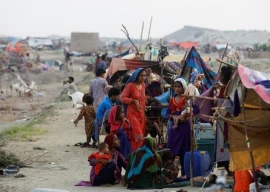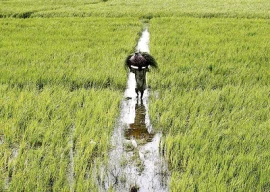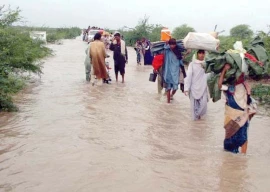
The National Assembly Standing Committee on Finance was informed on Friday the government would approach the bilateral and multilateral donors, including the International Monetary Fund (IMF) for support after completing the survey of flood damages.
The committee, which met with its newly-elected chairman Qaiser Sheikh in the chair, was informed that the economic impact of the ongoing floods was likely to be very high, as the rice export would fall, while cotton worth $3-4 billion would be imported.
The committee was given a briefing on the IMF programme, inflation, rupee depreciation and flood damage. The meeting deferred deliberations on the Riba Prohibition Bill and the Mudaraba Companies Amendment Bill.
Minister of State for Finance Dr Ayesha Ghaus Pasha told the committee that after the assessment of the damage caused by the floods, negotiations would be held with multilateral and bilateral international organisations for their assistance.
State Bank of Pakistan (SBP) Deputy Governor Dr Inayat Hussain said that economic uncertainty had increased due to floods. The National Disaster Management Authority (NDMA) survey of flood damages in Balochistan in Gilgit-Baltistan would be completed within 10 days.
Briefing the committee about the IMF deal, Dr Pasha said that $3.9 billion had been received from the IMF while an amount of $2.6 billion was due. She added that the volume of the IMF programme had been risen to $6.5 billion till June 2023
The chair asked Dr Pasha about the conditions attached with the IMF deal.
Pasha replied that when the government took over in April, the country’s external resources were abysmal, therefore, the IMF programme had to be revitalised. “Tough decisions were the most important to save a nuclear power from going bankrupt,” she added.
The IMF conditions, she said, included management plan to reduce circular debt, the Public Finance Management Act, single treasury account, the State Bank Act, law to protect against losses in government institutions and anti-money laundering, tax related conditions.
She added that the conditions for the restoration of the programme included tax reforms in the 2022-23 budget, generation of provincial surplus, energy prices, immediate withdrawal of subsidy on petrol, and imposition of petroleum levy.
“There are five conditions for the upcoming ninth IMF review, which include increase in electricity tariff, no tax amnesty, discouraging the culture of tax avoidance and a surplus of Rs153 billion in the primary budget,” the minister of state said.
“The burden of additional taxes will fall on the rich while the government expenditures will be controlled through austerity measures. The government will not borrow directly from State Bank,” she added.
Pasha assured that Rs364 billion budgets of the Benazir Income Support Programme (BISP) health and education would not be curtailed. She revealed that 10th and 11th review talks with the IMF would be held in February and June next year, respectively.
Brig Umar Chatha, NDMA’s Member Operations, told the committee that the survey of flood damages in Balochistan would be completed on September 25 and of Gilgit-Baltistan on September 20. He also apprised the committee of the latest data about flood losses.
Committee member Syed Hussain Tariq raised the issue of price hike and a free fall of the rupee value against the US dollar. He asked that the committee should be informed as to who was making money from the rising dollar.
Dilating on various reasons for rising inflation, Dr Pasha said the increase in prices, energy tariffs and depreciation of the rupee were the major causes of inflation. She added that food supply chain and the price control process had also been affected by floods.
Another committee member, Ramesh Kumar, told the minister of state that floods were blamed for inflation. He added that the dollar had gone above Rs240, the law and order situation has worsened due to inflation. The chair observed that dollar was no longer available.
Dr Inayat Hussain, the SBP deputy governor, told the committee that inflation not only hit the developing countries like Pakistan but also the developed countries. Increase in the global prices of commodities, energy and devaluation of the rupee were the causes of inflation, he added.
“The impact of the flood is likely to be high. Rice exports are expected to be $500 million less because of the floods, while cotton worth $3-4 billion will have to be imported. Similarly, food grains will also be imported,” Dr Hussain said.
Meanwhile, the committee deferred deliberations on the Riba Prohibition Bill and the Mudaraba Companies Amendment Bill. The Income Tax Amendment Bill was withdrawn by the government after it became part of the Finance Bill Amendment Act.



1730803801-0/BeFunky-collage-(22)1730803801-0-165x106.webp)

1728377970-0/Menendez-Brothers-(1)1728377970-0-165x106.webp)

1730799445-0/Untitled-design-(52)1730799445-0-270x192.webp)
1730800230-0/Copy-of-Untitled-(5)1730800230-0-270x192.webp)











1730706072-0/Copy-of-Untitled-(2)1730706072-0-270x192.webp)
COMMENTS
Comments are moderated and generally will be posted if they are on-topic and not abusive.
For more information, please see our Comments FAQ